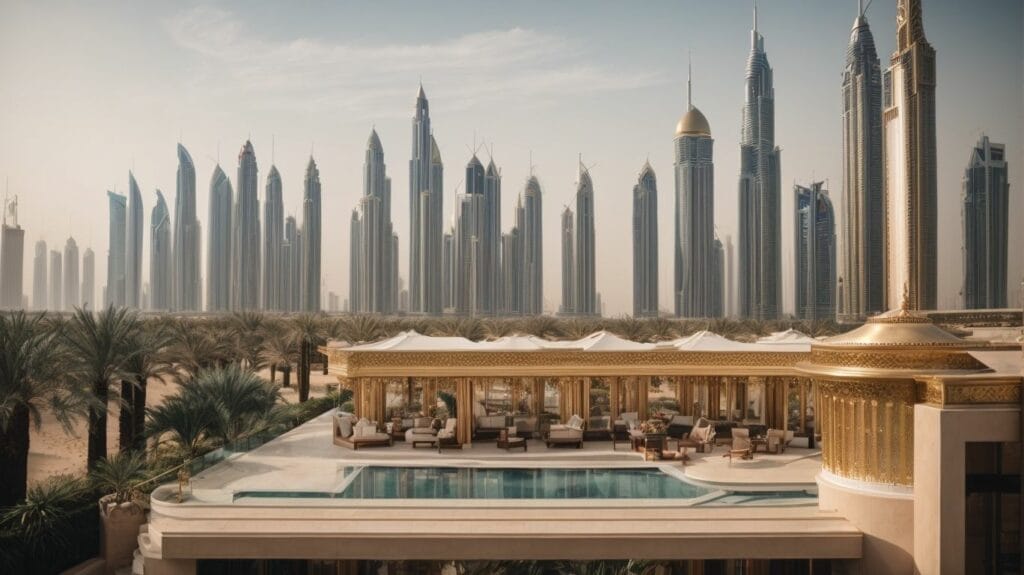Dubai, the bustling city in the United Arab Emirates, is known for its opulence and grandeur. It has earned a reputation as a wealthy city, attracting people from around the globe in search of luxurious lifestyle opportunities. In this article, we will explore the various aspects of Dubai’s wealth and understand what makes it a prosperous city.
Economic Overview of Dubai:
Dubai’s wealth can be attributed to several factors. The city has a diverse economy that has undergone significant growth and transformation over the years. Major sources of wealth in Dubai include trade, real estate, hospitality, tourism, finance, and logistics. These sectors have played a pivotal role in driving the city’s economic prosperity.
The Income and Wealth Distribution in Dubai:
Dubai boasts significant income and wealth distribution. The city attracts affluent individuals and high-net-worth individuals from across the globe, contributing to its reputation as a hub for luxury and extravagance. However, it is important to note that like any city, Dubai also experiences income disparities, with variations in the distribution of wealth among its residents.
The Key Sectors Driving Dubai’s Wealth:
Dubai’s economic growth is driven by key sectors that contribute to its wealth. Major industries in Dubai include real estate, construction, tourism, hospitality, finance, transportation, and logistics. The city has strategically positioned itself as a global business and tourism hub, attracting investments and enhancing its economic growth.
The Luxurious Lifestyle in Dubai:
Dubai is renowned for its luxurious lifestyle, offering high-end real estate options and a thriving market for luxury goods. The city is home to iconic structures, extravagant hotels, upscale shopping malls, and world-class restaurants. The demand for luxury goods and services in Dubai has contributed significantly to its wealth.
The Role of Oil in Dubai’s Wealth:
While Dubai’s economy has diversified over the years, oil has historically played a significant role in its growth and prosperity. Although Dubai’s reliance on oil as a primary source of wealth has reduced, it continues to contribute to the city’s economy through oil-related activities and investments.
The Impact of Tourism on Dubai’s Economy:
Tourism has been a vital contributor to Dubai’s economic success. The city attracts millions of tourists each year with its iconic landmarks, world-class hotels, and vibrant entertainment options. The tourism sector has provided significant employment opportunities and stimulated economic growth, further enhancing Dubai’s wealth.
Challenges to Dubai’s Wealth:
While Dubai has experienced immense growth and prosperity, there are various challenges that the city faces in maintaining its wealth. Some potential risks include economic volatility, regional instability, changing market dynamics, and global economic fluctuations. Addressing these challenges is essential to sustain Dubai’s wealth and ensure its long-term economic success.
Key takeaway:
- Dubai is a wealthy city: With a strong economy and major industries driving its wealth, Dubai enjoys a luxurious lifestyle and is known for its high-end real estate and luxury goods markets.
- Oil plays a role in Dubai’s wealth: While Dubai has diversified its economy, oil still contributes to its wealth as one of the key sectors. The city’s prosperity is also influenced by the impact of tourism on its economy.
- Dubai faces challenges to its wealth: Despite its wealth, Dubai is not immune to potential risks and challenges that could affect its economy. It must navigate these challenges to sustain its prosperity.
Economic Overview of Dubai
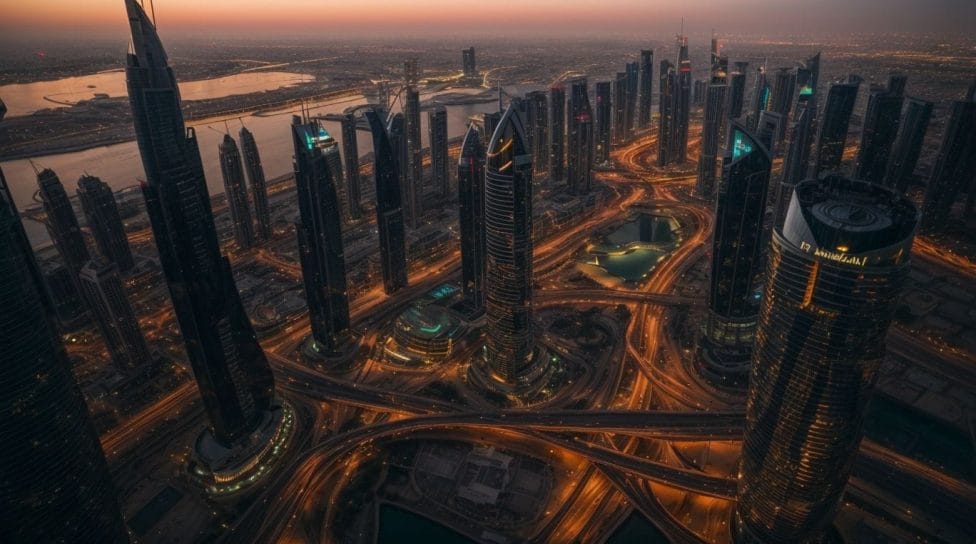
Photo Credits: Jetsetlegion.Com by Henry Nguyen
Dubai, known for its economic success and transformation, has become a major global hub for finance, trade, and tourism. Over the years, this city has experienced significant economic growth, attracting multinational companies and investors due to its strategic location, world-class infrastructure, and pro-business policies. The economy of Dubai is diversified, with key sectors including real estate, construction, hospitality, retail, and finance. Additionally, Dubai has prioritized the development of knowledge-based industries and innovation, further enhancing its economic landscape.
One pivotal factor in Dubai’s economic rise can be traced back to the discovery of oil reserves in the 1960s. Before that, Dubai primarily relied on trade and fishing. However, with the discovery of oil, the city experienced a substantial influx of wealth, leading to a fundamental transformation of its economy. Demonstrating prudent leadership and careful planning, the Dubai government wisely utilized the oil revenues to invest in critical sectors like infrastructure, tourism, and finance. This strategic decision propelled Dubai to emerge as an economic powerhouse, symbolizing unparalleled success in the region.
Today, Dubai’s economy continues to evolve and flourish by embracing innovation and diversification, ensuring consistent growth and prosperous outcomes.
What are the Major Sources of Wealth in Dubai?
The major sources of wealth in Dubai are diverse and include several key sectors. These sectors contribute significantly to Dubai’s economy and prosperity. Some of the major sources of wealth in Dubai are:
| 1. Oil: | Dubai has historically been a major player in the oil industry, with oil exports contributing to its economic growth and wealth. |
| 2. Trade and commerce: | Dubai’s strategic location and world-class infrastructure have made it a global hub for trade and commerce. The city’s free trade zones and business-friendly policies attract international companies and foster economic growth. |
| 3. Tourism: | Dubai’s tourism industry is a major driver of economic activity. The city’s world-renowned attractions, luxury hotels, and entertainment offerings attract millions of visitors each year, generating revenue and creating jobs. |
| 4. Real estate: | The real estate market in Dubai has been a significant source of wealth. The city’s iconic skyscrapers, luxury residential properties, and commercial developments have attracted investments from around the world. |
| 5. Financial services: | Dubai’s role as a regional financial center has contributed to its wealth. The city is home to numerous banks, investment firms, and financial institutions, offering a wide range of services to businesses and individuals. |
| 6. Manufacturing: | Dubai has developed its manufacturing sector, particularly in industries like construction materials, textiles, and food processing. This sector contributes to job creation and economic diversification. |
The major sources of wealth in Dubai encompass oil, trade and commerce, tourism, real estate, financial services, and manufacturing. These sectors continue to drive Dubai’s economic growth and prosperity.
The Income and Wealth Distribution in Dubai
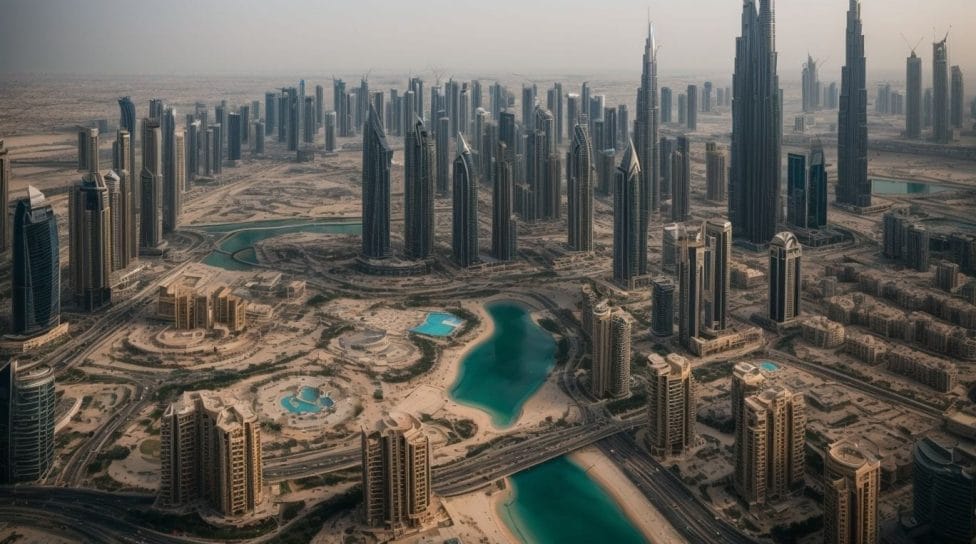
Photo Credits: Jetsetlegion.Com by Albert Brown
The income and wealth distribution in Dubai can be analyzed through various indicators such as GDP per capita, household income, and the concentration of wealth among the top earners.
| Indicator | Data |
| GDP per capita | $44,694 (2019) |
| Average household income | $10,960 per month |
| Top 10% of earners | Owns 85% of wealth |
Pro-tip: To have a more comprehensive understanding of the income and wealth distribution in Dubai, it is essential to analyze the data from multiple sources, such as official statistics and research studies, to ensure accuracy and reliability.
How Does Dubai Compare to other Cities in Terms of Wealth?
Dubai stands out among global cities when it comes to its wealth. How does Dubai compare to other cities in terms of wealth? Well, its Gross Domestic Product (GDP) per capita surpasses many major international cities, reaching $42,000. This impressive figure is a result of its strategic geographical location, diverse economy, and significant investments in key sectors. To compare Dubai’s wealth with other cities, we can look at indicators such as GDP growth rate, foreign direct investment, and the presence of global corporations. For instance, Dubai’s GDP growth rate of 4% outperforms many cities worldwide. This demonstrates its ability to attract investments, which is further supported by its free trade zones and business-friendly policies. In order to further enhance its wealth, Dubai should continue diversifying its economy and nurturing innovation.
The Key Sectors Driving Dubai’s Wealth
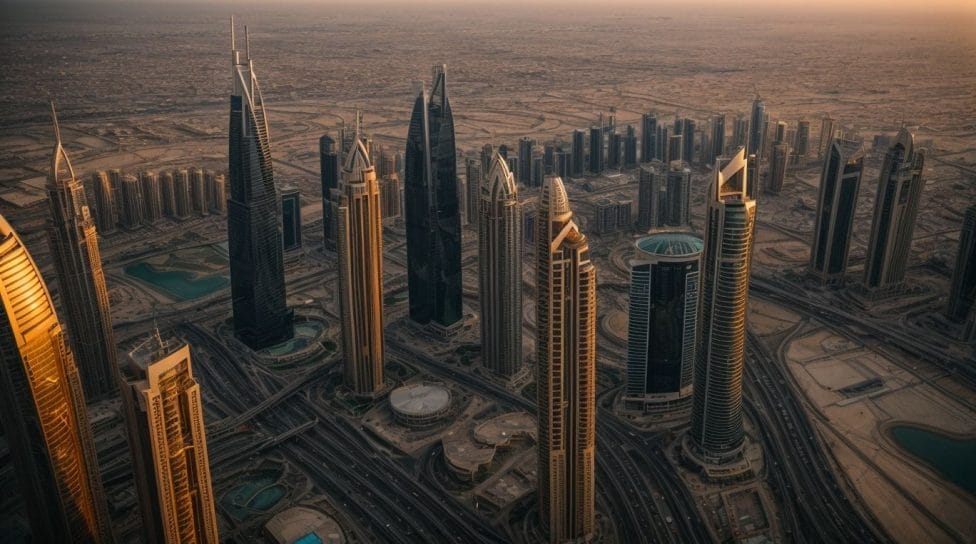
Photo Credits: Jetsetlegion.Com by Jerry Nelson
Dubai’s wealth is driven by several key sectors that have contributed to its rapid economic growth and prosperity.
- The Key Sectors Driving Dubai’s Wealth: Dubai’s booming real estate sector, with its iconic skyscrapers and luxury developments, has attracted both local and international investors, driving economic growth and creating job opportunities.
- The tourism industry, another key sector driving Dubai’s wealth, plays a significant role in its economy. The city’s world-class hotels, shopping malls, and entertainment options attract millions of visitors every year.
- Trade and Finance also contribute to Dubai’s wealth, as the city’s strategic location as a global trade hub and its business-friendly environment have made it an attractive destination for international companies and financial institutions.
- Transportation and Logistics are crucial sectors driving Dubai’s wealth. The city’s modern infrastructure, including state-of-the-art airports, seaports, and logistics facilities, has made Dubai a global transportation and logistics hub, facilitating regional and international trade.
- Technology and Innovation have played a key role in diversifying Dubai’s economy and attracting talent and investment in the tech sector. Dubai actively promotes and invests in cutting-edge technologies such as artificial intelligence and smart city initiatives.
These key sectors, among others, have played a crucial role in establishing Dubai as a wealthy and dynamic global city.
What are the Major Industries in Dubai?
Dubai is known for its diverse economy with several major industries contributing to its wealth. What are the Major Industries in Dubai? The major industries in Dubai include real estate, construction, tourism, finance, and hospitality. The city has seen significant growth in these sectors, attracting both local and international investors. The real estate market, in particular, has been a significant driver of Dubai’s economy, with luxurious properties and high-end developments attracting wealthy individuals. The tourism industry has played a crucial role in Dubai’s economic success, with millions of visitors flocking to the city each year. The finance and hospitality sectors have also flourished, offering a range of job opportunities and contributing to the overall prosperity of Dubai.
How Does Dubai Attract Investment?
Dubai attracts investment through several key strategies and factors. How Does Dubai Attract Investment? First, it offers a business-friendly environment with minimal bureaucracy and tax incentives, making it an attractive destination for foreign investors. The city’s strategic location also plays a crucial role, serving as a gateway between East and West. Dubai’s state-of-the-art infrastructure, including world-class ports and airports, enhances connectivity and facilitates trade. The government’s commitment to diversifying the economy and investing in sectors such as real estate, tourism, finance, and technology further boosts investor confidence. Dubai’s reputation for stability and security contributes to the inflow of investment, attracting both individuals and businesses seeking growth opportunities.
The Luxurious Lifestyle in Dubai
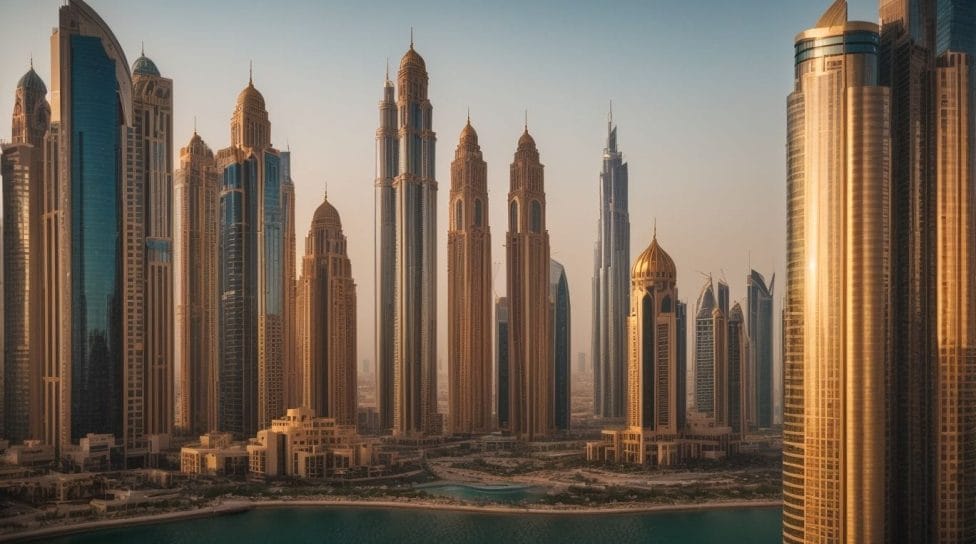
Photo Credits: Jetsetlegion.Com by Richard White
Dubai is renowned for The Luxurious Lifestyle in Dubai it offers, attracting both residents and visitors.
The city provides a vast array of opulent experiences and amenities designed to cater to those seeking the finer things in life. From the extravagant Burj Al Arab hotel to the high-end Mall of the Emirates shopping mall, Dubai truly embodies luxury. Furthermore, The Luxurious Lifestyle in Dubai transcends material possessions with its world-class dining options, exclusive clubs, and lavish spas. It comes as no surprise that Dubai has become synonymous with luxury and indulgence. A fascinating fact: The Luxurious Lifestyle in Dubai is highlighted by the Burj Khalifa, the world’s tallest building, which stands magnificently at a staggering height of 828 meters.
What are the High-End Real Estate and Luxury Goods Markets Like in Dubai?
The high-end real estate and luxury goods markets in Dubai are thriving, making it a paradise for luxury enthusiasts. This magnificent city boasts extravagant properties, from luxurious villas on the Palm Jumeirah to opulent penthouses in Downtown Dubai. Equipped with state-of-the-art amenities, these properties offer breathtaking views of the city skyline and the Arabian Gulf. When it comes to luxury goods, Dubai is renowned for its upscale shopping malls, such as the Dubai Mall and Mall of the Emirates, which house a plethora of international luxury brands. From designer fashion and jewelry to high-end cars, Dubai provides a myriad of luxury options for discerning shoppers. So, what are the high-end real estate and luxury goods markets like in Dubai? They are thriving, offering a paradise for luxury enthusiasts.
The Role of Oil in Dubai’s Wealth
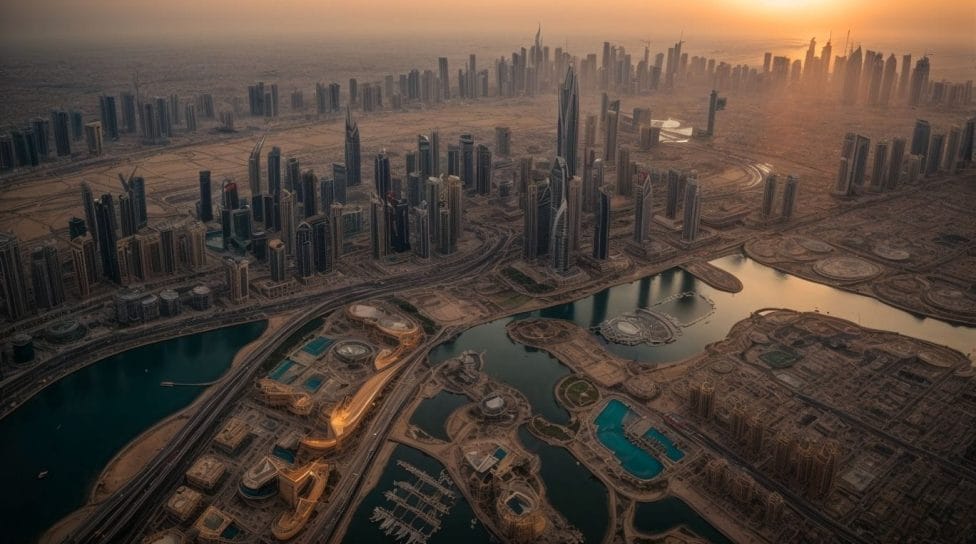
Photo Credits: Jetsetlegion.Com by Zachary Hall
Dubai’s wealth is largely attributed to The Role of Oil in its economy. Oil was discovered in Dubai in the 1960s, and its production and exportation significantly boosted the country’s revenue. The oil industry brought in foreign investments, created job opportunities, and allowed for the development of infrastructure and diverse economic sectors. Recognizing the finite nature of oil reserves, Dubai has been proactive in diversifying its economy. Today, sectors such as tourism, real estate, finance, and trade contribute significantly to the city’s wealth. This diversification strategy ensures a sustainable and prosperous future for Dubai beyond its reliance on oil.
The Impact of Tourism on Dubai’s Economy
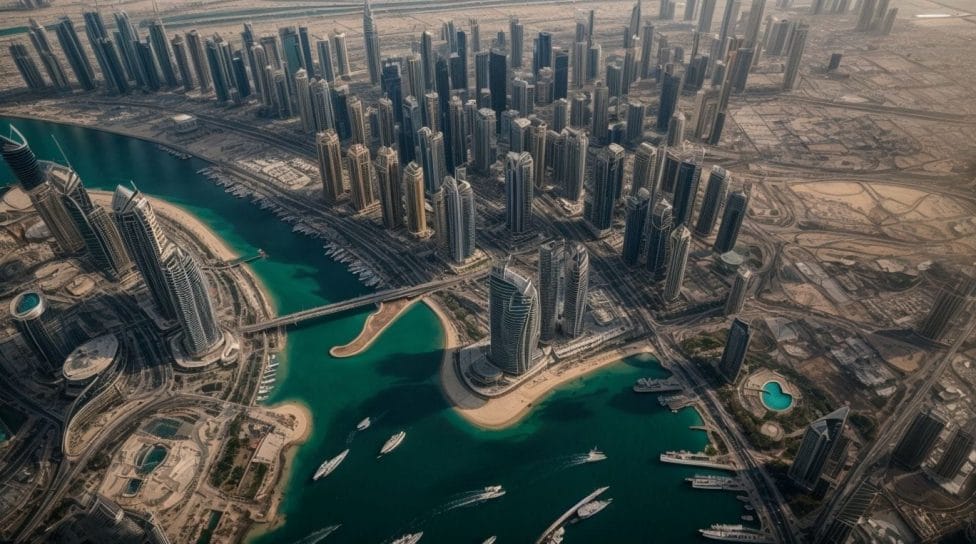
Photo Credits: Jetsetlegion.Com by Ralph Smith
The Impact of Tourism on Dubai’s Economy is profound and undeniable. Tourism plays a significant role in Dubai’s flourishing economy, greatly contributing to its wealth and development. With its impressive infrastructure, luxurious hotels, and world-class attractions, Dubai has firmly established itself as a global tourist destination. The influx of tourists not only brings in substantial revenue through sectors such as hospitality, transportation, entertainment, and retail, but it also stimulates employment opportunities, boosts investments, and enhances the overall economic growth of the city. Dubai’s sustainable focus on tourism has solidified its position as a wealthy city and a major player in the global tourism market.
Challenges to Dubai’s Wealth
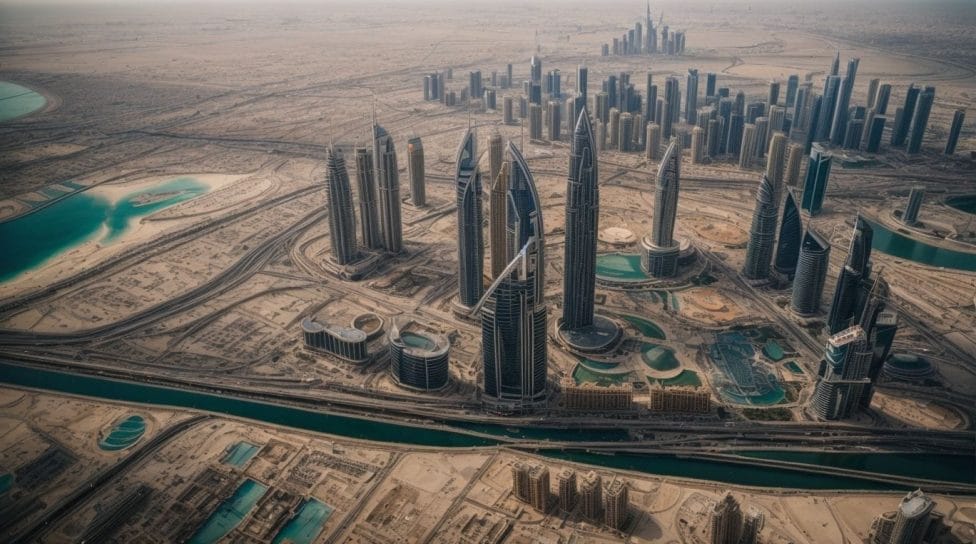
Photo Credits: Jetsetlegion.Com by Peter Anderson
Dubai’s wealth faces several challenges to its prosperity that need to be addressed. Economic diversification is a key challenge as the city relies heavily on oil revenues, making it vulnerable to fluctuations in global oil prices. To overcome this, Dubai should concentrate on investing in sectors such as tourism, technology, and finance to diversify its economy.
Another challenge is social inequality despite the city’s wealth. Efforts should be made to ensure a more equitable distribution of wealth, providing opportunities for all residents.
Sustainability is also a concern due to Dubai’s rapid development, which has raised environmental issues. To resolve this, the city should adopt sustainable practices and invest in renewable energy to protect natural resources and mitigate the effects of climate change.
Furthermore, Dubai faces geopolitical instability in the region, posing a threat to its growth. To mitigate this risk, the city should focus on fostering strong diplomatic relations.
To maintain prosperity, Dubai should prioritize diversification, income equality, sustainability, and stability. By doing so, the city can enhance its resilience and secure long-term economic success.
What are the Potential Risks for Dubai’s Economy?
Dubai’s economy faces several potential risks that could impact its prosperity, making it essential to address and mitigate these challenges. When considering the potential risks for Dubai’s economy, some key factors come to mind.
Firstly, economic diversification is a crucial aspect to be addressed. The heavy reliance on oil as a revenue source leaves Dubai susceptible to fluctuations in oil prices. To overcome this vulnerability, Dubai should prioritize efforts towards diversifying its economy and reducing dependence on oil.
Secondly, geopolitical instability poses a significant risk to Dubai’s economy due to its strategic location in the Middle East. Given the political and security risks in the region, any conflict or instability can have adverse effects on Dubai’s economy. Therefore, it becomes crucial to promote stability and work towards minimizing these risks.
Moreover, Dubai is not immune to economic shocks that can arise from global economic downturns or financial crises. Particularly, the real estate and financial sectors, which are major contributors to Dubai’s wealth, can be significantly impacted. Strengthening resilience against such shocks is essential to ensure the stability of the economy.
In addition, Dubai faces tough competition from other Gulf cities that are also striving to attract investment and tourism. To sustain economic growth, Dubai must maintain its competitive edge and continuously enhance its appeal as a business and tourist destination.
Furthermore, being a desert city, Dubai is vulnerable to the effects of climate change, including water scarcity and extreme temperatures. To ensure long-term economic stability, Dubai must address these challenges proactively and adopt sustainable practices to mitigate the risks associated with climate change.
Lastly, the ongoing COVID-19 pandemic has had a significant impact on Dubai’s tourism and hospitality sectors. The recovery of these industries remains uncertain, posing additional risks to the economy. Dubai should closely monitor the situation, take appropriate measures, and plan for a resilient recovery.
To safeguard the economy, Dubai must prioritize diversification, promote stability, strengthen resilience against economic shocks, and adapt to the evolving global and regional dynamics. By addressing these potential risks wisely, Dubai can increase its chances of securing a prosperous and stable economic future.
Some Facts About Is Dubai Wealthy?
- ✅ Dubai’s primary sources of income include the port, oil, tourism, and property development. (Source: Our Team)
- ✅ Dubai’s economy is diverse, with trade, transportation, technology, tourism, and finance playing significant roles. (Source: Our Team)
- ✅ Most of Dubai’s income comes from the manufacturing of goods, the provision of services, and tourism. (Source: Our Team)
- ✅ Dubai is the 6th richest city in the world according to WorldAtlas. (Source: Our Team)
- ✅ Dubai’s success is attributed to industries such as maritime, transportation, tourism, aluminium, cement, real estate, and healthcare. (Source: Our Team)
